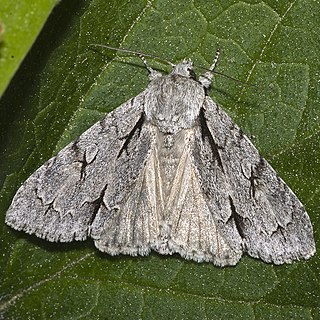
Acronicta is a genus of noctuid moths containing about 150 species distributed mainly in the temperate Holarctic, with some in adjacent subtropical regions. The genus was erected by Carl Linnaeus in his 1758 10th edition of Systema Naturae. Caterpillars of most Acronicta species are unmistakable, with brightly colored hairy spikes, and often feed quite visibly on common foliate trees. The hairy spikes may contain poison, which cause itchy, painful, swollen rash in humans on contact. The larva of the smeared dagger moth is unusually hairy even for this genus. Acronicta species are generally known as dagger moths, as most have one or more black dagger-shaped markings on their forewing uppersides. But some species have a conspicuous dark ring marking instead.

Acronicta lanceolaria, the lanceolate dagger moth or pointed dagger, is a moth of the family Noctuidae. The species was first described by Augustus Radcliffe Grote in 1875. It is found in North America, from Nova Scotia to British Columbia. It is listed as a species of special concern and believed extirpated in the US state of Connecticut.
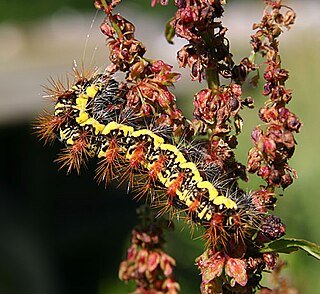
Acronicta oblinita, the smeared dagger moth or arioch dagger, is a moth of the family Noctuidae. Its larva, the smartweed caterpillar, has urticating hairs. The species was first described by James Edward Smith in 1797.

Acronicta tritona, the Triton dagger moth, is a moth of the family Noctuidae. The species was first described by Jacob Hübner in 1818. It is found in eastern North America, from Nova Scotia west to north-eastern Alberta, south to Florida and Texas, and west to Oregon.

Acronicta lepusculina, commonly known as the cottonwood dagger moth, is a species of moth in the family Noctuidae. The species was first described by Achille Guenée in 1852. It is found in most of eastern North America, west through southern Canada to Vancouver Island and southward.

Acronicta sperata, the hopeful dagger moth, is a moth of the family Noctuidae. The species was first described by Augustus Radcliffe Grote in 1873. It is found in North America from New Brunswick west to the Alberta foothills, south to the District of Columbia, Missouri and in the mountains to Colorado.
Acronicta cyanescens is a moth of the family Noctuidae first described by George Hampson in 1909. It is found in western North America, from extreme south-western Alberta west, and south to New Mexico.

Acronicta fragilis, the fragile dagger moth, is a moth of the family Noctuidae. The species was first described by Achille Guenée in 1852. It is found in North America from Newfoundland to Florida, west across Canada, south to Kentucky and Minnesota. It is listed as a species of special concern in the US state of Connecticut.
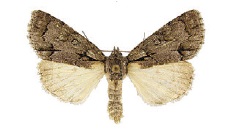
Acronicta grisea, the gray dagger, is a moth of the family Noctuidae. The species was first described by Francis Walker in 1856. It is found from the Atlantic to the Pacific coast in southern Canada and the northern United States.
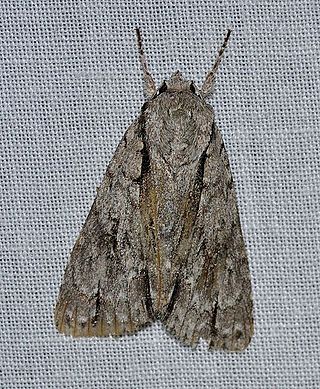
Acronicta hasta, the forked dagger moth, speared dagger moth, cherry dagger moth or dart dagger moth, is a moth of the family Noctuidae. The species was first described by Achille Guenée in 1852. It is found in North America in the eastern deciduous woodlands, ranging west across southern Saskatchewan and Alberta into central southern British Columbia, south to Tennessee, Wisconsin and Kansas.

Acronicta impressa, the impressive dagger moth or willow dagger moth, is a moth of the family Noctuidae. The species was first described by Francis Walker in 1856. It is found from western Canada to north-western Mexico.

Acronicta innotata, the unmarked dagger moth or birch dagger, is a moth of the family Noctuidae. The species was first described by Achille Guenée in 1852. It is found from Newfoundland to British Columbia and adjacent northern states in the United States, south in the east to North Carolina and Kentucky.

Acronicta interrupta, the interrupted dagger moth, is a moth of the family Noctuidae. The species was first described by Achille Guenée in 1852. It is found across southern Canada south of the boreal forest, from New Brunswick west to eastern Alberta, south to Georgia, Nebraska and Arizona.

Acronicta longa, the long-winged dagger moth, is a moth of the family Noctuidae. The species was first described by Achille Guenée in 1852. It is found across much of North America, with Nova Scotia, Alberta, Florida, and Texas within is range.

Acronicta mansueta, the gentle dagger moth, is a moth of the family Noctuidae. The species was first described by Smith in 1897. It was considered a synonym of Acronicta falcula, but was reinstated as a valid species in 2011. It is widespread in western North America, from southern Saskatchewan west to southern British Columbia, and south to at least Colorado and California.

Acronicta radcliffei, or Radcliffe's dagger moth, is a moth of the family Noctuidae. The species was first described by Leon F. Harvey in 1875. It is found in eastern and southern North America.
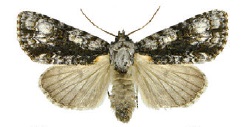
Acronicta superans, the splendid dagger moth, is a moth of the family Noctuidae. The species was first described by Achille Guenée in 1852.
Acronicta vulpina, the vulpina dagger moth or miller dagger moth, is a moth of the family Noctuidae. The species was first described by Augustus Radcliffe Grote in 1883. It is found in North America from New York and Newfoundland west to central British Columbia, south to Colorado.

Acronicta lupini, the lupine dagger or little bear, is a moth of the family Noctuidae. The species was first described by Augustus Radcliffe Grote in 1873. It is found from Quebec, Newfoundland and Labrador, British Columbia, Alberta and Yukon in Canada, south to California.

Acronicta insita, the large gray dagger or fingered dagger, is a moth of the family Noctuidae. The species was first described by Augustus Radcliffe Grote in 1874. It is found from Newfoundland west to the Pacific coast and Vancouver Island and Haida Gwaii, British Columbia, south to North Carolina and Colorado.











